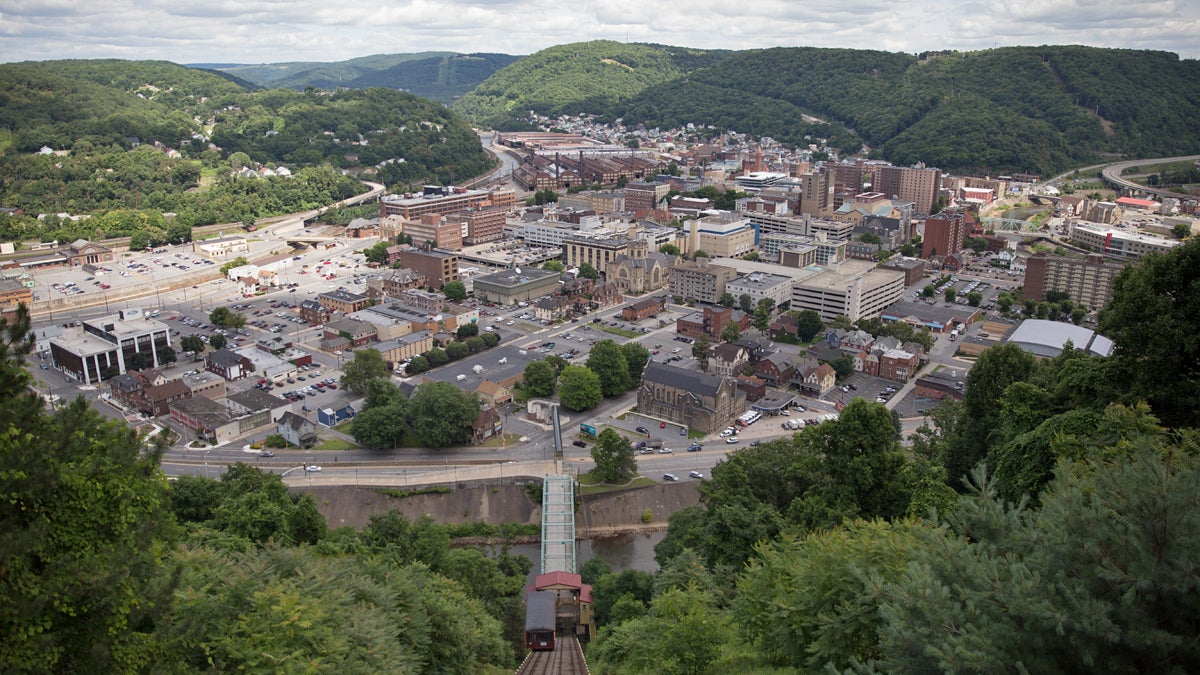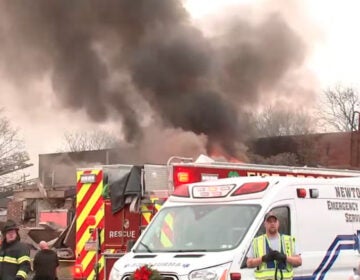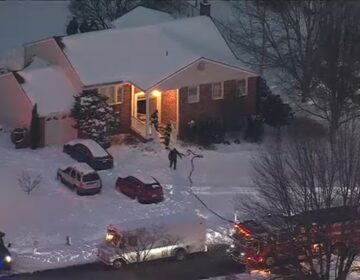Johnstown residents bristle over town’s portrayal in recent viral article on Trump supporters
A widely shared article used Johnstown, Pennsylvania as a lens to showcase the loyalty of President Trump’s supporters. But local residents are balking at the portrait.

A bird’s eye view of Johnstown, Pennsylvania. (Lindsay Lazarski/WHYY)
A widely-shared Politico article used Johnstown, Pennsylvania as a lens to showcase the loyalty of President Trump’s supporters one year after his election. But local residents are balking at the portrait of Johnstown that emerged from the story.
The story depicted Johnstown as a “depressed former steel town” facing massive population loss and an opioid epidemic, filled with residents happy to give Trump a pass no matter his actions or unfulfilled promises.
It earned a lot of attention based on the bluntly racist comments of some of the interviewees.
Mary Lou Davis, co-founder of the progressive group “Indivisible Johnstown,” says the article didn’t capture the full spirit of the town. Although Trump won Cambria County with over 68 percent of the vote in the 2016 presidential election, Hillary Clinton narrowly edged the president in Johnstown, according to the Pittsburgh City Paper.
Johnstown also elected two African-American Democrats to city council in a recent municipal election. Davis laments that the author omitted these details, and instead sought out and included voices that confirmed a stereotype of her town as a rundown backwater.
“It was a snapshot of what he chose to see and whom he chose to speak with,” Davis said. “[Politico] may have their idea of what a ‘typical Trump supporter’ is, and the people they sought out fit that completely, but there are wealthy suburbs surrounding Johnstown that supported Trump, but they weren’t included in the article.”
Davis noted that the New York Times published an article in June, looking into the declining retail industry in Johnstown with what she viewed as a more balanced tone — detailing pros and cons.
Author Michael Kruse, senior writer at Politico, defended his piece. He says while his article might portray a frustrating reality, that doesn’t mean it’s inaccurate.
“Johnstown is representative for a Trump base,” Kruse said. “A blue-collar area, coal and steel, a lifeblood that used to provide a much more secure and much more comfortable standard of living than it does now.”
Kruse reported from Johnstown last November, with the headline “What Trump Voters Want Now.” He said this article was meant to follow up with the people he spoke with last year, gauging their approval of the president’s performance.
He says he merely documented what he saw and heard on his return visit.
“I wasn’t hoping for anything,” he said.
He was surprised, though, how much attention the article earned. Bill Duryea, an enterprise editor at Politico, declined to provide metrics, but said “it was one of the most widely read stories Politico Magazine produced this year.”
Kruse said Johnstown’s problems are evident, and it’s not his job to sand down the edge.
“I don’t doubt that it’s disappointing to see your community, if you live in Johnstown, painted in this way,” he said. “But I don’t think any of them would disagree with the assessment that it used to be better in Johnstown.”
A coalition of city leaders objected to Kruse’s narrow focus. On Wednesday, Politico published Johnstown’s response, co-signed by figures including its mayor, the county commissioners and community organizers.
“Unfortunately, for readers outside of our region, this story created a picture of a community that does not reflect who we are and what we believe,” they wrote. “So, technically, while it made for an interesting read, Kruse got it wrong.”
Jem Spectar, the president of University of Pittsburgh at Johnstown, also wrote a comprehensive rebuttal — fearing that the perception this article gives will undermine local efforts to revitalize the city.
“It did not sufficiently capture the great things that we believe are happening in Johnstown and the region. It also did not point to a way forward,” Spectar said. He mentioned the growing healthcare and technology industries in town, the new businesses, and other grassroot initiatives taking place.
Both sides are keeping open the door to a follow-up.
“I would’ve liked to see them come back and do an actual article,” Davis said, one that represents “what Johnstown really is.”
“If people in Johnstown can find a way to solve those problems, it could be a blueprint for how to do that elsewhere,” Kruse said. “If and when that happens, I’ll get on an airplane and come back.”
WHYY is your source for fact-based, in-depth journalism and information. As a nonprofit organization, we rely on financial support from readers like you. Please give today.





